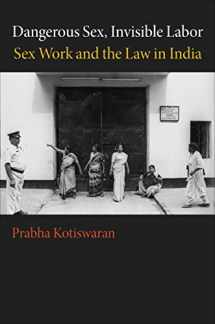
Dangerous Sex, Invisible Labor: Sex Work and the Law in India
ISBN-13:
9780691142500
ISBN-10:
0691142505
Author:
Prabha Kotiswaran
Publication date:
2011
Publisher:
Princeton University Press
Format:
Hardcover
312 pages
FREE US shipping
Book details
ISBN-13:
9780691142500
ISBN-10:
0691142505
Author:
Prabha Kotiswaran
Publication date:
2011
Publisher:
Princeton University Press
Format:
Hardcover
312 pages
Summary
Dangerous Sex, Invisible Labor: Sex Work and the Law in India (ISBN-13: 9780691142500 and ISBN-10: 0691142505), written by authors
Prabha Kotiswaran, was published by Princeton University Press in 2011.
With an overall rating of 4.3 stars, it's a notable title among other
books. You can easily purchase or rent Dangerous Sex, Invisible Labor: Sex Work and the Law in India (Hardcover) from BooksRun,
along with many other new and used
books
and textbooks.
And, if you're looking to sell your copy, our current buyback offer is $0.3.
Description
Popular representations of third-world sex workers as sex slaves and vectors of HIV have spawned abolitionist legal reforms that are harmful and ineffective, and public health initiatives that provide only marginal protection of sex workers' rights. In this book, Prabha Kotiswaran asks how we might understand sex workers' demands that they be treated as workers. She contemplates questions of redistribution through law within the sex industry by examining the political economies and legal ethnographies of two archetypical urban sex markets in India. Kotiswaran conducted in-depth fieldwork among sex workers in Sonagachi, Kolkata's largest red-light area, and Tirupati, a temple town in southern India. Providing new insights into the lives of these women--many of whom are demanding the respect and legal protection that other workers get--Kotiswaran builds a persuasive theoretical case for recognizing these women's sexual labor. Moving beyond standard feminist discourse on prostitution, she draws on a critical genealogy of materialist feminism for its sophisticated vocabulary of female reproductive and sexual labor, and uses a legal realist approach to show why criminalization cannot succeed amid the informal social networks and economic structures of sex markets. Based on this, Kotiswaran assesses the law's redistributive potential by analyzing the possible economic consequences of partial decriminalization, complete decriminalization, and legalization. She concludes with a theory of sex work from a postcolonial materialist feminist perspective.


We would LOVE it if you could help us and other readers by reviewing the book
Book review

Congratulations! We have received your book review.
{user}
{createdAt}
by {truncated_author}


